- Home
- Michael Grant
Hero Page 3
Hero Read online
Page 3
Armo waved that off. “Shorts and a T-shirt. Come on. They gave me one of those tent things, a cabana or whatever—I didn’t even ask. It’s got room for, like, six people. And they already brought me a massive fruit-and-cheese platter.”
Cruz said, “Give me a minute and I’ll find a picture I can morph into.” She laughed, and it sounded just a bit hysterical. “You could be hanging out with Olivia Wilde or someone.”
Armo made a face. “Yeah, see, I don’t know who that is. Come on, Cruz, don’t make me carry you.”
“You wouldn’t want that, Cruz,” Shade said with a careful neutrality that Dekka recognized as knowing mockery, earning Shade a discreetly hidden upraised middle finger from Cruz.
“Okay, I’ll change into shorts.”
Armo flopped onto the sofa, nearly bouncing Shade off, and said, “That’ll take a minute. So in sixty seconds or less, explain this whole space-alien-extra-universe thing.”
Dekka looked around at them, seeing happy faces. Good. It was good to be happy. You never knew when it might be for the last time.
CHAPTER 2
Manhattan Mayhem
“FOOLS AND THEIR money are soon parted,” Bob Markovic said to his daughter, Simone. “It’s not illegal to profit from people’s stupidity.”
“No, just immoral,” Simone snapped.
It was an argument they’d had more than once. A tired argument, but one still fed by powerful emotions on both sides. In some ways it was a proxy argument, Simone knew, a stand-in for a series of grudges between them, most especially Simone’s decision to live with her mother and not her father following their divorce.
“Yes, well, morality and profit don’t always walk hand in hand,” Markovic muttered. “I live in the real world, not some college seminar.” He stood leaning against the stone balustrade of his fourteenth-floor balcony and waved his hand to encompass New York City in late afternoon. Slanting light turned the buildings far across Central Park into dark silhouettes and dabbed the trees with yellow and orange. “Different worlds, different realities.”
Bob Markovic was in an expansive mood, which Simone knew meant that he’d had a good and profitable day. The payday loan company he owned, Markovic’s Money Machine (offices all across the Northeast and upper Midwest), was doing gangbusters business. The whole country was on a mad panic-buying spree, grabbing up all the things they could never really afford, booking travel to places where people expected to be safe from the rolling apocalypse of the rock—New Zealand was very popular—and stocking cellars with emergency supplies and guns.
Guns, guns, guns, like that will keep them safe.
Simone Markovic had not had a productive day. She’d attended two classes at NYU—accounting and art appreciation. The accounting class had been a compromise to keep her father happy enough to continue paying tuition. The art class was her own choice. She didn’t really enjoy either class, but she would be damned if she’d admit to her father that art per se was not going to be her thing. What she wanted to study was filmmaking, but that seemed so unlikely to be useful that she had a hard time fighting for it in the face of his (and even her mother’s) skepticism. But for some time now, ever since she’d made the decision that film would be her thing, she’d seen the world around her in a frame, a series of shots.
Fade in: The arrogant tycoon is framed against a setting sun.
Simone had also put in a shift at an Italian restaurant, working as a hostess, a personal choice meant to give her some appreciation of what life was like for working people. The answer was: hard. The waitstaff messed with her because they knew she was a little rich girl, slumming. They cut her out of pooled tips, snapped at her every mistake, and never invited her for after-work drinks. Her manager would not stop hitting on her, despite a thirty-year age difference and her explanation that she liked girls, and even if she switched teams it would still not involve dating a married man in his late forties.
And then there was the matter of the general restaurant-going public. Simone tried to love humanity, but from the vantage point of the restaurant business, it wasn’t easy.
So, all in all, Simone was in a bad mood and inclined to pick a fight. “You give them loans you know they can’t pay back.”
“That’s the most profitable kind of loan,” Markovic said with a laugh. “You don’t want to loan a man a dollar and get a dollar and ten cents back the next day. You want to loan a man a dollar and have him pay you just the ten cents interest, but day after day, month after month after month. At the end of a few months you’ve made a dollar profit, and they still owe you the first dollar.”
Cut to: A mother of three counts the money she’s borrowed to buy Christmas presents, knowing she can never repay it.
Simone clenched her jaw. She was eighteen, white, a college freshman with blond hair she wore in a haystack bob, a cut meant to look casual, even indifferent, but which had cost three hundred dollars at her mother’s favorite salon. From the ground up, she wore a pair of red Doc Martens, torn blue jeans, a green-and-black Hillbilly Moon Explosion T-shirt, and a black leather jacket. She wore silver rings in two lip piercings and three more in one ear. Simone’s intention was not to look like a little rich girl, but she was self-aware enough to recognize that she just looked like a rich girl trying not to look like one.
Simone Markovic lived with her mother over on the West Side, and despite arguing with her, too, on a regular basis, they actually got along well enough. This was her weekend with Dad—who approved of very little about Simone except her last name. They had a contentious relationship, had since Simone had transitioned from girlhood to young womanhood. They were two strong-willed people with very different worldviews. But had Simone been given truth serum, she’d have admitted that she loved her morally blind father and knew that he loved her in return.
Bob Markovic lived on the fourteenth floor of a prestigious building on Fifth Avenue, facing Central Park. The condo had four bedrooms, a separate office, and maid’s quarters. It was decorated in what was almost a parody of masculinity of the aggressive, Hemingway variety. Markovic liked to hunt, and he liked to claim trophies, and he didn’t much care whether a beast was endangered or not. The main room of the apartment was painted the green of a pool table’s felt, with dark walnut molding. The walls were festooned with mounted animal heads: a water buffalo spread its gracefully curved horns nearly five feet; a polar bear looked startled; an entire eight-foot-long tiger had been stuffed and now stood menacingly in the corner by a floor-to-ceiling bookshelf.
Simone hated that room.
Slow pan of room reeking of sociopathy and masculine insecurity.
The apartment also had a long, narrow balcony opening onto a view of Central Park. It was on that balcony that Markovic and Simone sat nibbling on a plate of crudités and drinking a bottle of Tuscan red wine. Simone’s father might be a rapacious businessman and a skirt-chasing hound who had cheated on Simone’s mother repeatedly, but he was mellow where underage consumption of alcohol was concerned.
There were times Simone wondered how she would ever get through a weekend with him without being able to drink. Probably, she thought, he understood that and took the easy way out by keeping her glass filled.
Markovic made an effort to shift the conversation to less fraught grounds. “How are classes working out?”
“Fine.” The all-purpose conversation-killer: fine.
Markovic frowned. He was a good-looking man. Back in the days when Simone still had friends over, they’d often made sotto voce comments on her “hot dad.” But a full head of dark hair, broad shoulders, and fine features went only so far in distracting from dismissive brown eyes and what might be called “resting prick face.”
“Hey, look!” Markovic pointed up to where dark blue seemed ready to smother the setting sun. He leaned forward against the carved, waist-high balustrade.
Simone joined him and saw a bright pinpoint of light, far to the southwest. At first she thought it might be a star, but t
he light . . . actually, now that she squinted it was two lights . . . while tiny, were piercing. The lights had appeared suddenly, grown, and blinked out. But now, from that same direction came trails, sparks of fast-moving brightness.
“Shooting stars?” Simone suggested.
Markovic shook his head. “Damned if I know.”
Simone was just about to plead homework as an excuse to get away when it became suddenly, terrifyingly clear that the fast-moving sparks were not dimming or going away. In fact—
BOOOM!
A window-rattling concussion as the sound barrier was broken, and a heartbeat behind that, a shattering crash that literally shook the ground beneath Simone’s feet.
“What the hell?” Markovic cried.
BOOOM! BOOOM!
Across the park, the Majestic, a luxury apartment building that rose in twin twenty-nine-story towers, exploded outward as a massive boulder blew through it like a baseball thrown through a Lego structure. The meteorite boulder tumbled across the park, annihilating anything in its path. Behind the boulder came tons of brick and steel and eviscerated bodies that fell on the street and into the park like a landslide, completely blocking Central Park West, crushing trees and burying the bridle path.
Neither Simone nor Markovic had time to move, time even to react, when something like hail but infinitely faster hit them and knocked them flat. Simone had a flash of herself flying backward through the glass balcony door that had been blown out by the same hurtling shrapnel a millisecond before her head would have crashed into plate glass.
When she opened her eyes, the view was inexplicable. She was staring sideways at a dark fireplace at the far end of a stretch of carpet. There was a ringing in her ears and a pounding in her head so intense she half believed someone was beating her with a stick. Tiny pebbles, some barely larger than dust or sand, littered the floor.
Simone sat up and was overwhelmed by a feeling of nausea that nearly made her vomit. Then came the pain. Pain everywhere in her body; arms, chest, face, all hurt like she’d been battered. It felt as if every part of her was bruised.
Only then did she notice the blood.
Close-up on blood-smeared hands.
Simone stared in horror and realized that it was her blood, her own blood seeping from half a dozen punctures in the side of her left hand, more on the back of her right hand, more still up both arms, holes, most so tiny they could almost be insect bites that she’d scratched bloody. But other holes were bigger, like the hole an ice pick might make.
Blood seeped through her clothing, dots of red growing like poppies, and she felt a scream rising inside her. She scrabbled to her feet, nausea and pain making the world tilt and spin, and lurched on wobbly legs to the big, framed mirror over the mantel.
It was like a scene from Carrie. Her face was red with blood dribbling from half a dozen tiny holes, one within an inch of blowing out her right eye. It was like she’d been attacked by a porcupine. But this was Manhattan, for God’s sake; there were no porcupines.
She tore off her T-shirt and gaped at similar puncture wounds across her shoulders and chest, down to her belly. Only her legs had been left untouched, protected by the stone balustrade.
“Dad? Daddy?” she cried in a wavering voice. “Daddy?”
She found him, unconscious, pierced as she was, bloody, and with his left hand hanging by veins and viscera. She screamed and fell to her knees beside him, looking for signs of life. His chest rose and fell; he was breathing, but the blood, the blood was gushing from his wrist. Simone pulled out her phone—it was pierced and dead. She ran for the landline and dialed 911 with trembling fingers and blurted out her fears to a harried operator. Then she ran back to her father, pulled off his belt, and used it as a tourniquet for his wrist.
She succeeded in slowing if not stopping the arterial flow, dragged an ottoman over, and elevated his feet as she’d learned in some half-forgotten first-aid course. Then she ran back to the balcony, thinking of shouting down to the street for help.
But one glance told her that help would be slow in coming.
The Majestic had only been the first building to be annihilated. The apartment building half a block south had been hit, and its wreckage now spilled across Fifth Avenue. Flames rose in huge columns, south near Rockefeller Center. Only then did she begin to realize the extent of the horror.
Mom! I have to call Mom!
But now the phone circuits were jammed. Manhattan had suffered the equivalent of a bombing attack.
Exterior. Upper East Side Manhattan. Evening. Like something out of a World War II movie, shattered buildings, fire and smoke.
If she was going to save her father’s life, it would be up to her, alone. Step One: getting a man nearly twice her weight to the elevator, something she accomplished by hauling at the edge of the carpet he lay on.
Bob Markovic had two cars in the garage below street level, a black Mercedes S-Class roughly the size and weight of a small yacht, and a classic Triumph TR3 with a standard transmission. Simone found both keys in her father’s pocket and chose the Mercedes. Markovic was not a small man, and cramming him, unconscious, into a tiny sports car was not going to work.
Simone dragged her father out of the elevator and out onto the concrete, leaving a slimy trail of blood. The car was a hundred feet away, and she sensibly decided to bring the car to him.
He was moaning and making slight movements, but was nowhere near being able to walk, and it took enormous effort to heft him into the back seat, made no easier by the pain rocketing around her own body, not to mention that her hands were slick with blood.
It had been a while since Simone’s one and only driving lesson, and she moved at creeping speed up the ramp and out onto Fifth Avenue.
The emergency-room entrance to the hospital was jammed with cars, taxis, and ambulances, so Simone had to abandon the car a block away, but she found a helpful passerby who took one of her father’s shoulders while she took the other. Inside the emergency room was chaos, orderlies, nurses, security guards all trying to cope with dozens of people marked by the same pinpricks, as well as some far more seriously hurt. One woman, hauled along unconscious by her two teenaged children, was missing the left side of her face. A woman cried and begged for attention as she cradled a blood-soaked mass of blankets swaddling a blessedly unseen baby.
Simone had no choice but to leave her father lying on the floor, where he risked being trampled, as she competed for the attention of besieged nurses.
After an interminable wait, during which time the numbers of patients doubled every few minutes, orderlies came to whisk Bob Markovic away on a gurney. Then Simone, too, was led to a line of curtained bays, all full to overflowing, and told to sit on the floor and wait. All around her a controlled panic of doctors and nurses dealt with burns, crush injuries from falling walls and roofs, terrible cuts from flying glass, panic-induced heart attacks, and quite a few with injuries like Simone’s.
Simone waited and sat and oozed blood for hours, listening to cries of pain and screams of grief, forgotten in the mayhem. At one point she noticed that she was sitting in a pool of her own blood, that it had saturated the seat of her trousers. But her body was fighting back, deploying clotting factors, doing all that a billion years of evolved survival mechanisms could to keep the blood on the inside.
She managed to use a nurse’s station line to call her mother, who was, thankfully, alive but unable to go anywhere since a piece of rock had blown right through the elevator in her building. Simone also called her current girlfriend, Mary, and snagged a few acetaminophen, which did almost nothing to dull the bruising pain in her body or the migraine building steam in her head.
After hours of waiting, after multiple unanswered questions about her father’s condition, they put Simone through a full-body CT scan. A doctor had ordered an MRI, but that was before another victim had been placed in the machine. MRIs use superpowerful magnets, and no one had realized the shrapnel was magnetic. The first patient
in the MRI had been ripped to hamburger by dozens of bits of the rock being drawn through the meat of her body.
Two hours after the CT scan, and far into the night, they were telling her nothing. But the staff—justifiably exhausted and haggard—looked more than just tired; they looked scared.
Explanation of what had happened came not from any of the doctors but from Mary, who’d had to walk twenty-three blocks through a city lit by police-vehicle light bars and accompanied by a soundtrack of sirens, car horns, and burglar alarms. The subway was shut down. Cabbies had all headed for cover. Buses were being used as emergency treatment facilities.
Mary’s first words were not helpful. “Oh, my God, Simone! Oh, my God!”
Simone tried to smile, but her face was stiff from impact bruises, and a dozen bandages dotted her body. “Yeah, I know, sweetheart, it’s gruesome. And I think my dad is worse off; they won’t even tell me what’s happening with him.” Simone was not prone to hysteria, but she heard the edge of it in her own voice.
“Don’t worry. It will be okay.” Mary’s tone carried no conviction, and her face was a mask of disgust. She kept moving her hands as if about to reach out to Simone, but then kept pulling away, as if she was frightened.
“I don’t even know what happened,” Simone said.
“Haven’t you seen the news?”
“What do you mean?”
“It was one of those rocks. You know, like the ones that turn people into mutants or whatever?”
“Mary, what are you talking about?”
Mary shrugged. “I’m just saying what the news says. They said a big rock, a meteorite or asteroid or whatever, was heading toward Manhattan, so they nuked it.”
The bright pinpoints of light: nuclear explosions going off at the edge of space.
“The nukes broke it up, I guess, but it still hit. There’s buildings burning and all. I had to cross the park, and it’s full of people all scared to death. People are saying it’s worse than 9/11.” Mary had started to cry, which angered Simone: Mary wasn’t the one bleeding.

 Fear
Fear Plague
Plague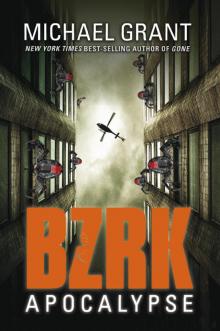 BZRK: Apocalypse
BZRK: Apocalypse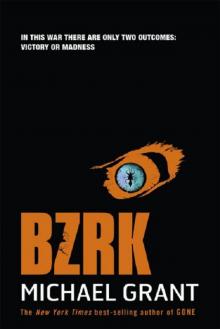 Bzrk
Bzrk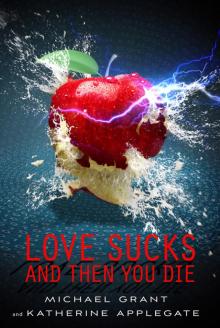 Love Sucks and Then You Die
Love Sucks and Then You Die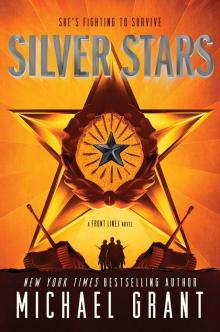 Silver Stars
Silver Stars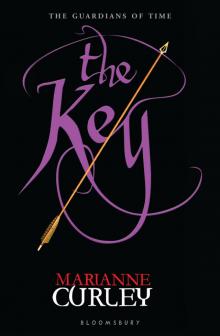 The Key
The Key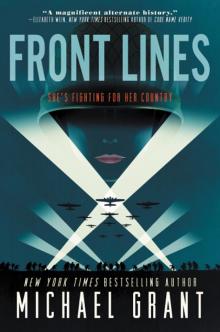 Front Lines
Front Lines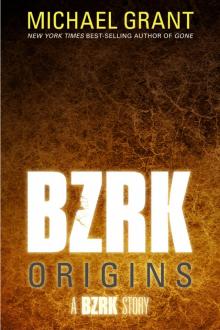 BZRK Origins
BZRK Origins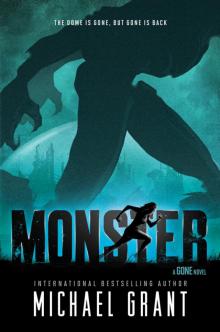 Monster
Monster Gone
Gone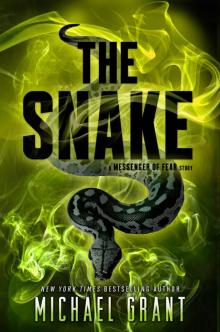 The Snake
The Snake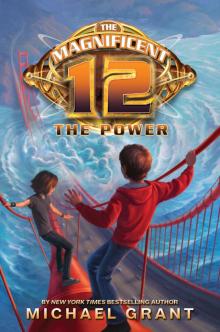 The Power
The Power Hunger
Hunger Lies
Lies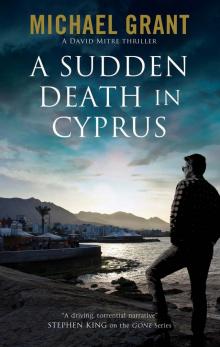 A Sudden Death in Cyprus
A Sudden Death in Cyprus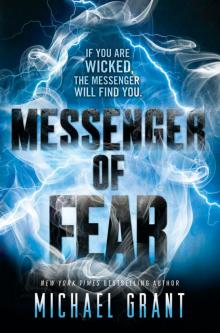 Messenger of Fear
Messenger of Fear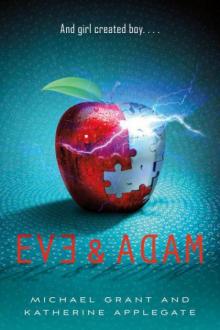 Eve & Adam
Eve & Adam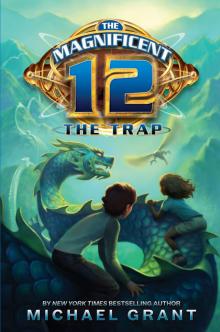 The Trap
The Trap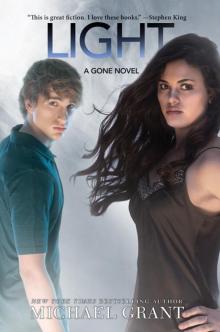 Light
Light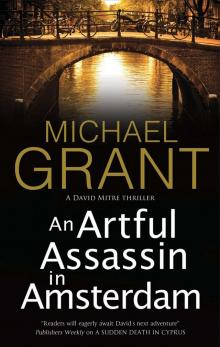 An Artful Assassin in Amsterdam
An Artful Assassin in Amsterdam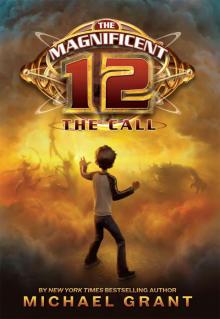 The Call
The Call Hero
Hero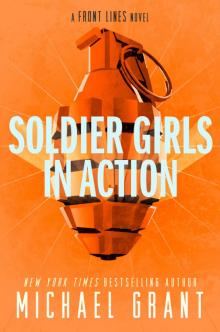 Soldier Girls in Action
Soldier Girls in Action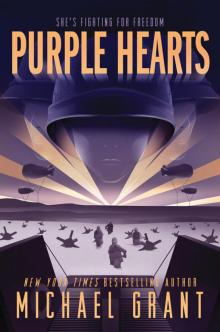 Purple Hearts
Purple Hearts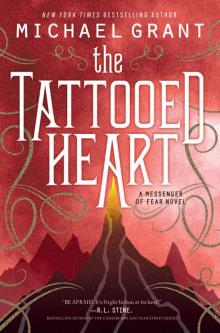 The Tattooed Heart
The Tattooed Heart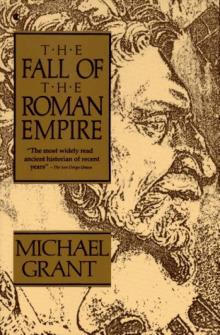 The Fall of the Roman Empire
The Fall of the Roman Empire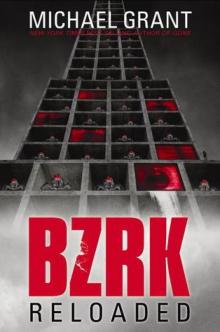 BZRK Reloaded
BZRK Reloaded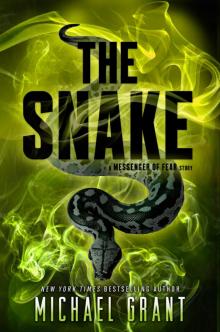 Messenger of Fear Novella #1
Messenger of Fear Novella #1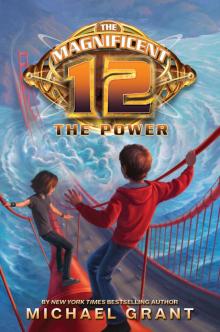 The Magnificent 12
The Magnificent 12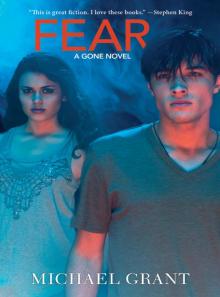 Fear: A Gone Novel
Fear: A Gone Novel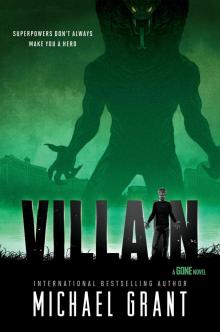 Villain
Villain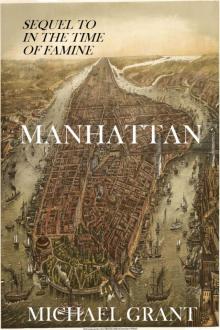 Manhattan
Manhattan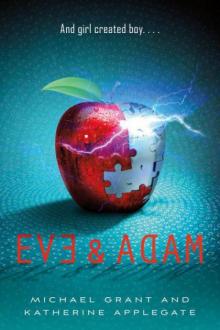 Eve and Adam
Eve and Adam Plague: A Gone Novel
Plague: A Gone Novel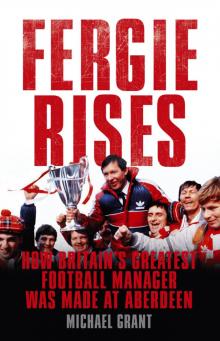 Fergie Rises
Fergie Rises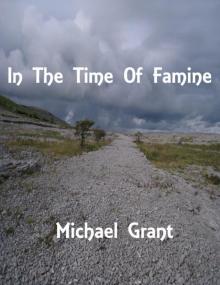 In the Time of Famine
In the Time of Famine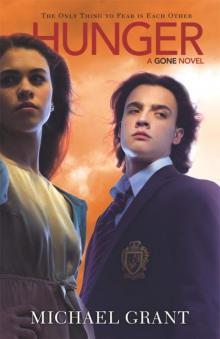 Hunger_A Gone Novel
Hunger_A Gone Novel Lies g-3
Lies g-3